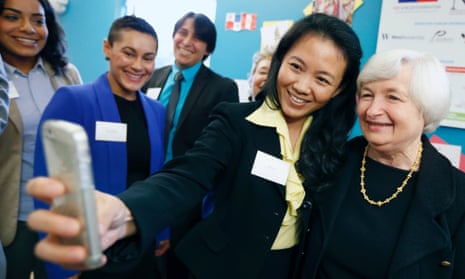Janet Yellen, the chair of the US Federal Reserve and the most powerful woman in American finance, has taken a strong stance suggesting that the growing rift between the rich and the poor in the US is a cause for great concern.
In a speech pointedly titled “Perspectives on Inequality and Opportunity from the Survey of Consumer Finances”, Yellen spoke in the strongest terms about the rise in economic inequality and chided the US for falling behind on its economic standards. Yellen delivered her remarks to an audience of economists at a conference about inequality at the Federal Reserve Bank of Boston.
“The extent of and continuing increase in inequality in the United States greatly concern me,” Yellen said. She noted that “the distribution of income and wealth in the United States has been widening more or less steadily for several decades, to a greater extent than in most advanced countries.”
Yellen suggested that such a trend, unaddressed, was contrary to the founding principles of the United States. “I think it is appropriate to ask whether this trend is compatible with values rooted in our nation’s history, among them the high value Americans have traditionally placed on equality of opportunity,” she said.
She also cited the “Great Gatsby curve,” – “the finding that, among advanced economies, greater income inequality is associated with diminished intergenerational mobility”.
To that end, she cited four “building blocks” to build economic opportunity. They include more resources for children, affordable higher education, business ownership and inheritances.
Yellen acknowledged that business ownership and inherited wealth are usually seen as privileges of the rich, but she countered that they also benefit the middle class and “may also play a role in providing economic opportunities to a considerable number of families below the top”.
Yellen’s comments dovetail with concerns about inequality among other global central bankers. Yves Mersch, a board member of the central bank of Luxembourg, took a stand this morning against massive stimulus measures from the Federal Reserve and the European Central Bank, on the reasoning that they widen the gap between the rich and poor.
“Non-conventional monetary policy, in particular large scale asset purchases, seem to widen income inequality,” Mersch said.
Separately, Treasury Secretary Jack Lew recently encouraged the World Bank to address inequality in developing economies.
“Social inclusion is the basis for shared prosperity, as marginalized groups often account for a disproportionate share of the bottom 40% of income earners in developing countries,” Lew said on 6 October. “In showing how countries can improve their overall economic prospects by creating opportunities for all members of society, the World Bank can facilitate a shift in the treatment of women and minority groups.”
The strong tone of Yellen’s speech adds to the increasing discussion around economic inequality that was first popularized by the Occupy movement and then crystallized in the blockbuster success of Thomas Piketty’s Capital in the 21st Century, which posited in part that invested and inherited wealth will always accumulate faster than general economic growth. Yellen cited Piketty’s book and his other work with his frequent research partner, Emmanuel Saez.
The speech also serves as one of Yellen’s first and most striking policy statements to define the early months of her term as chair of the Federal Reserve. Yellen has previous spoken of long-term unemployment as a major issue and has worked to highlight the human cost of joblessness, but inequality has only received oblique mentions before now.

Comments (…)
Sign in or create your Guardian account to join the discussion